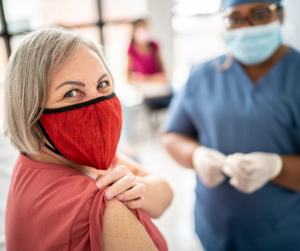 The U.S. Department of Health and Human Services (HHS) announced last week that it has developed a plan to begin offering booster shots this fall for those who have received the Pfizer/Comirnaty and Moderna vaccines to protect against COVID-19. It anticipates boosters as well for those who received the Johnson & Johnson/Janssen vaccine, but that information will come later because that vaccine became available a few months after Pfizer and Moderna.
The U.S. Department of Health and Human Services (HHS) announced last week that it has developed a plan to begin offering booster shots this fall for those who have received the Pfizer/Comirnaty and Moderna vaccines to protect against COVID-19. It anticipates boosters as well for those who received the Johnson & Johnson/Janssen vaccine, but that information will come later because that vaccine became available a few months after Pfizer and Moderna.
HHS says it’s prepared to offer booster doses of Pfizer and Moderna beginning the week of Sept. 20, with the timing set eight months after an individual’s second dose.
A final determination and plan will be subject to the Food and Drug Administration conducting an independent evaluation and determination that booster doses of Pfizer and Moderna are safe and effective and a recommendation for boosters from the CDC Advisory Committee on Immunization Practices.
So what does this mean for those of us who have received these vaccines?
First, the HHS announcement reinforces that all COVID-19 vaccines approved in the U.S. remain “remarkably effective” at reducing the risk of severe illness, hospitalization, and death. While the vaccine you received continues to provide you with robust protection, even against the highly contagious Delta variant, recommending a booster dose takes into account the reasonable expectation that protection could diminish in the months ahead.
Second, we expect booster doses for the general population to be handled much like third doses recommended recently for those with weakened immune systems. With vaccine readily available and the eight-month mark staggering when people should receive boosters, you should expect to receive a booster dose at a pharmacy, healthcare provider, or another place where you usually get vaccinations. For those living in a long-term care facility or other congregate care setting, federal partners are finalizing plans to conduct vaccinations in partnership with retail pharmacies, similar to the rollout of the first two doses of vaccine. Do note that HHS says it’s best to receive a third dose of the vaccine type you received initially, though it will offer guidance for situations when that isn’t possible.
This important announcement shouldn’t detract from the continuing need for everyone to get vaccinated and the fact that the recent increase in cases is primarily among those who aren’t vaccinated. During July and the first half of August, better than 86% of COVID-19 cases in Arizona have been among those who aren’t fully vaccinated. You are far more likely to become seriously ill, to be hospitalized, and to die from COVID-19 if you aren’t fully vaccinated.
I strongly recommend that those who have yet to be vaccinated consult their doctors and get the facts about COVID-19 vaccines. They are safe, free, highly effective, and available at convenient locations statewide. This week, the Food and Drug Administration gave full approval for the Pfizer/Comirnaty vaccine for those 16 and older, and all vaccines have received thorough reviews to ensure their safety and efficacy.










